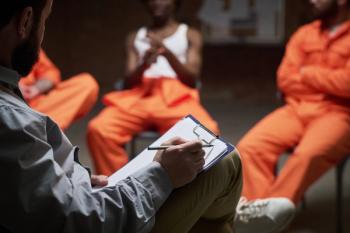
Interrogations-Medical Ethics Versus Mr Big
The subject of physician participation in interrogations continues to surface as an issue of debate.
The subject of physician participation in interrogations (either military-related or law enforcement–related) continues to surface as an issue of debate. Why? I contend the answer could fill several texts, but rather than begin with minutiae, allow me to state what I believe undergirds most debates on this issue: Terror. No, not terrorism per se, but terror of death.1 Most proponents of psychiatrist participation in interrogations argue that the “broader ethical/moral concerns would trump those [of professional ethics],” and that it would be acceptable to “obtain information from a detainee that would prevent the deaths of others.”2(p137)
Let us be clear-this is the “argument from the terror management” position. I do not mean to critique in any way a physician’s admirable desire to prevent deaths caused by man’s inhumanity to man. Rather, I question whether there is any real evidence that psychiatrist participation in such interrogations offers any value above and beyond that which military or law enforcement specialists are capable of providing. This is worth considering in terms of a cost-benefit analysis-because there is certainly a recognizable cost to psychiatrist participation.
Both the American Psychiatric Association (APA) and the AMA have issued position statements that prohibit psychiatrists from “direct participation” in interrogations.3,4 The APA defines participation as “being present, asking or suggesting questions, or offering advice to interrogators.” APA ethical guidelines have made it clear that it is unethical for a psychiatrist to participate in procedures that constitute torture. My own opinion on the subject derives from the fundamental ethics of forensic psychiatry (honesty, striving for objectivity, and respect for persons), which would militate against participation in interrogations.5 Finally, it has been noted that psychiatrists’ participation in interrogation of detainees, such as prisoners at Guantnamo Bay, may vio-late not only APA and AMA ethics but also the Geneva Conventions and the Code of Medical Ethics of the World Medical Association.6
Early in the “war on terror,” when rumors of physician participation became an issue, American physicians were advised that when “faced with a conflict of interest between following national policies or international principles of humanitarian law and medical ethics,” they should adhere to the latter.7,8 Yet years have passed and we still see the issue surfacing in the headlines. Physicians for Human Rights (PHR) released a new report, Experiments in Torture: Evidence of Human Subject Research and Experimentation in the “Enhanced” Interrogation Program. The report claims to reveal evidence that CIA medical personnel engaged in the crime of illegal experimentation on prisoners.9
Specifically, the report says that physicians “collected data on the impact of the interrogations on the detainees in order to refine those techniques and ensure that they stayed within the limits established by the Bush administration’s lawyers.”10 The physicians were allegedly present during interrogations to judge the emotional and physical impact of the techniques. This was ostensibly to help “calibrate” the level of pain experienced by detainees during interrogation, so that detainee’s pain level did not cross the administration’s legal threshold for torture. The CIA has denied the PHR’s charges.
You ever dance with the devil in the pale moonlight?
– The Joker (Jack Nicholson in Batman)
Military forensic psychiatrists who consult in this area must grapple with conflicting duties, according to the Department of Defense.11 Such conflicts are not likely to be easily resolved because the Department of Defense has endorsed a “Behavioral Science Policy” that appears to support psychiatrists providing advice to interrogators.11 Thus, the ethical conflict for the military psychiatrist would involve an order to provide interrogation assistance that the military has deemed to be a compelling matter of national security versus the APA and AMA prohibition of direct participation.
But what about our conduct here at home-in particular, interrogation assistance to local or federal law enforcement? After all, the same “argument from terror management” could be made: it is needed to prevent possible deaths of innocent citizens by various criminal elements. All of the previously mentioned ethical prohibitions would seem to still apply. The APA makes clear what constitutes participation, and this prohibits involvement by psychiatrists. But again, I must ask: Is our “assistance” really even required or necessary? Recall that law enforcement may legally use a wide array of deceptive techniques to garner a confession. The use of “deception per se will not be considered a sufficiently egregious action to invalidate confessions or lead to the exclusion of other evidence.”12
Case in point: the controversial “Mr Big technique.” The Mr Big technique “is a non-custodial interroga-tion tactic wherein suspects are drawn into a supposed criminal organization (actually an elaborate police sting) and subsequently told that to move up in the organization, they must confess to a crime.”13 Setting aside for now the issue of how such practices might elicit false confessions, it seems that law enforcement is doing just fine on its own in devising novel psychological manipulations of suspects.
Instead of asking whether we should participate in interrogations, I believe the proper question should be: How can psychiatric and behavioral science protect against the likelihood of false confessions? For example, it has been concluded that all interrogations be subject to mandatory videotaping.14 In this day and age, arguments against such a policy do not carry much weight. If we are truly interested in elucidating the truth, what is there to fear from videotaping an interrogation?
That is, unless one actually desires a dance with the devil, in the pale moonlight.
References:
References
1.
Pyszczynski T, Solomon S, Greenberg J.
In the Wake of 9/11: The Psychology of Terror.
Washington, DC: American Psychological Association; 2003.
2.
Meyers J. Re: Lies and coercion: why psychiatrists should not participate in police and intelligence interrogations [letter to the editor].
J Am Acad Psychiatry Law
. 2007;35:137.
3.
American Medical Association. Physician participation in interrogation. CEJA report 10-A-06 of the Council on Ethical and Judicial Affairs. 2006.
http://www.ama-assn.org/ama1/pub/upload/mm/369/ceja_recs_10a06.pdf
. Accessed June 23, 2010.
4.
American Psychiatric Association. Psychiatric participation in interrogation of detainees: position statement. May 2006.
http://archive.psych.org/edu/other_res/lib_archives/archives/200601.pdf
. Accessed June 23, 2010.
5.
Janofsky JS. Lies and coercion: why psychiatrists should not participate in police and intelligence interrogations.
J Am Acad Psychiatry Law
. 2006;34:472-478.
6.
Halpern AL, Halpern JH, Doherty SB. “Enhanced” interrogation of detainees: do psychologists and psychiatrists participate?
Philos Ethics Humanit Med
. 2008;25:21.
7.
Singh JA. American physicians and dual loyalty obligations in the “war on terror.”
BMC Med Ethics
. 2003;4:E4.
8.
Miles SH. Medical ethics and the interrogation of Guantanamo 063.
Am J Bioeth
. 2007;7:5-11.
9.
Physicians for Human Rights.
http://physiciansforhumanrights.org
. Accessed June 25, 2010.
10.
Risen J. Medical ethics lapses cited in interrogations.
New York Times
. June 6, 2010.
http://www.nytimes.com/2010/06/07/world/07doctors.html
. Accessed June 23, 2010.
11.
Marks JH, Bloche MG. The ethics of interrogation-the US military’s ongoing use of psychiatrists.
N Engl J Med
. 2008;359:1090-1092.
12.
Appelbaum PS. Law and psychiatry: deception, coercion, and the limits of interrogation.
Psychiatr Serv
. 2009;60:422-424.
13.
Smith SM, Stinson V, Patry MW. High-risk interrogation: using the “Mr Big Technique” to elicit confessions.
Law Hum Behav
. 2010;34:39-40.
14.
Kassin SM, Drizin SA, Grisso T, et al. Police-induced confessions, risk factors, and recommendations: looking ahead.
Law Hum Behav
. 2010;34:49-52.
Newsletter
Receive trusted psychiatric news, expert analysis, and clinical insights — subscribe today to support your practice and your patients.







